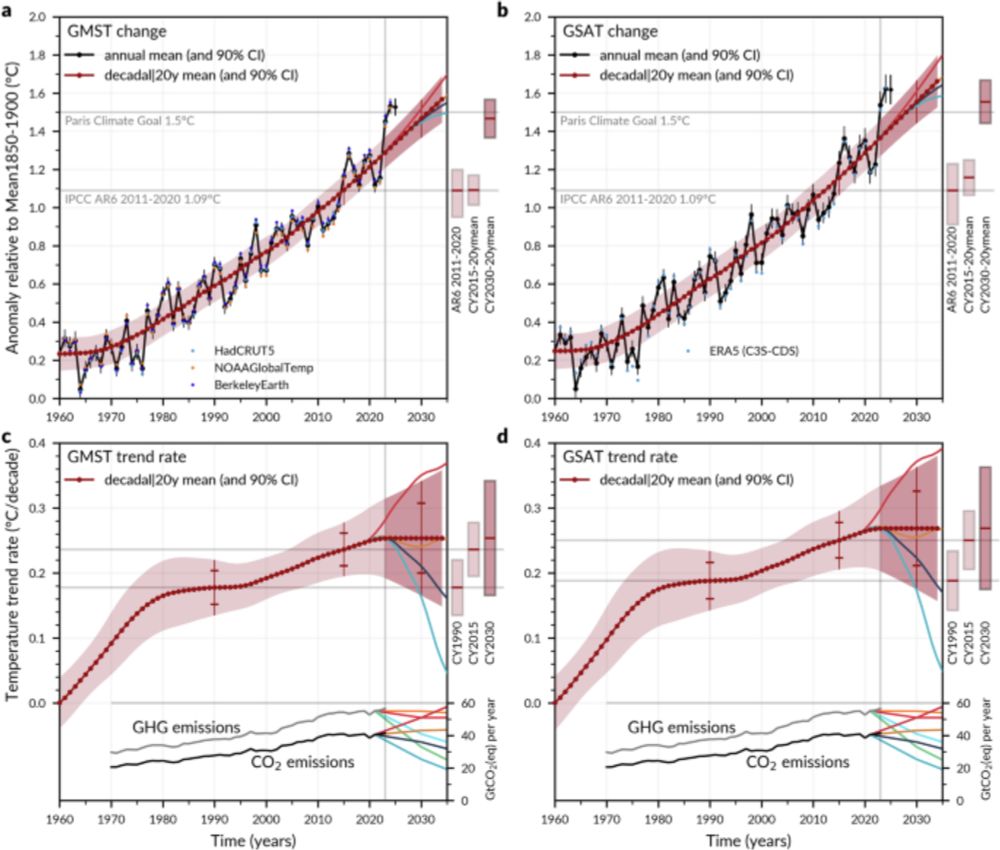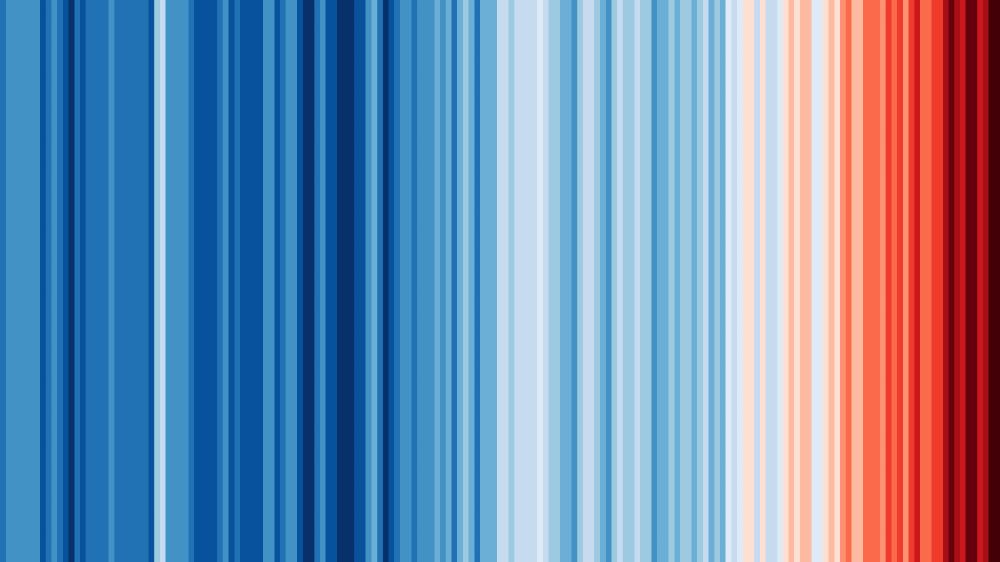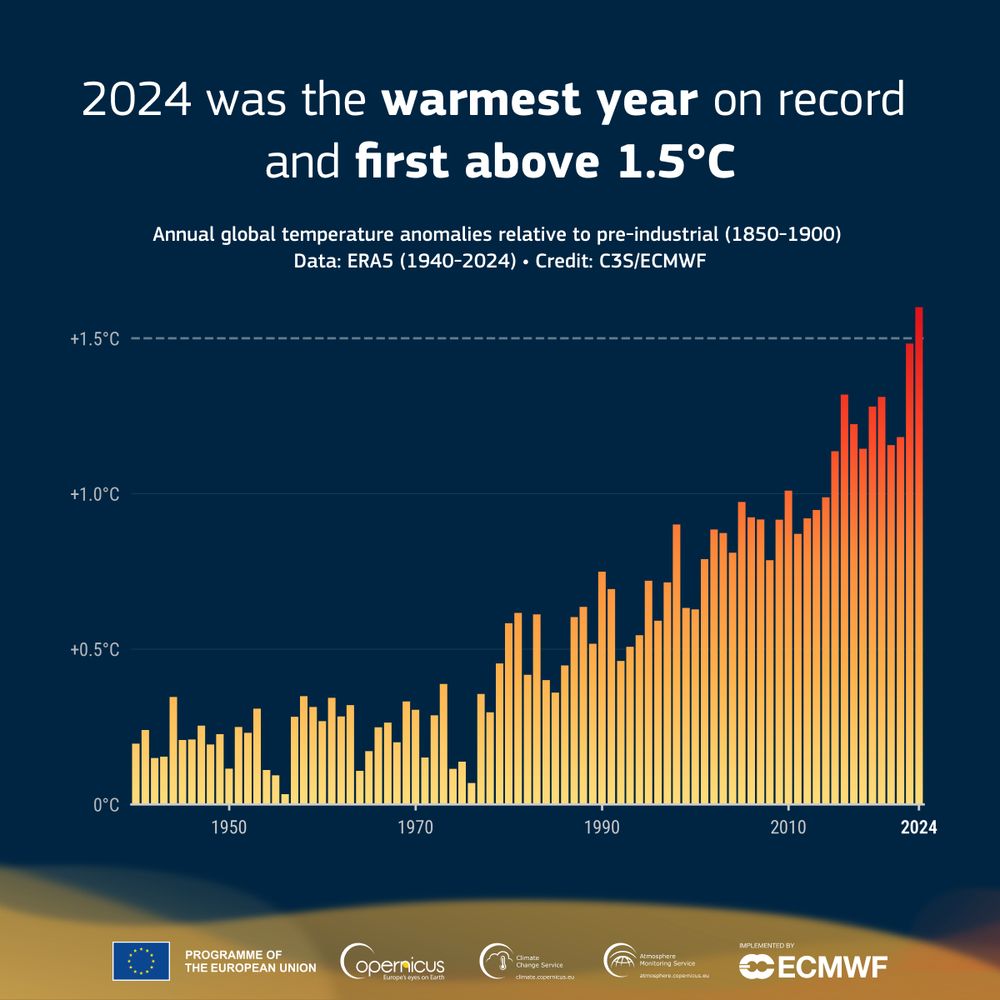
Moritz Pichler
@moritzpichler.bsky.social
Climate scientist & PhD student @ University of Graz / Wegener Center for Climate and Global Change.
Reposted by Moritz Pichler
Sad to see that leadership didn’t approve of my suggested post language (assuming since this is what is posted) that I submitted on my last day in May as the social media manager.
Allow me share some of our team’s kind words here instead:
Allow me share some of our team’s kind words here instead:

June 27, 2025 at 9:54 PM
Sad to see that leadership didn’t approve of my suggested post language (assuming since this is what is posted) that I submitted on my last day in May as the social media manager.
Allow me share some of our team’s kind words here instead:
Allow me share some of our team’s kind words here instead:
Reposted by Moritz Pichler
"Österreich hat sein CO2-Budget für das 1,5-Grad-Ziel bereits 2022 verbraucht."
www.derstandard.at/story/300000...
www.derstandard.at/story/300000...

1,5-Grad-Schwelle wird wohl schon 2028 übertroffen – und die Erwärmung beschleunigt sich
Einer bahnbrechenden neuen Studie zufolge wurde das CO₂-Budget für das 1,5-Grad-Ziel bereits aufgebraucht. In weiten Teilen Österreichs ist es bereits jetzt teilweise um drei Grad wärmer
www.derstandard.at
June 2, 2025 at 9:41 AM
"Österreich hat sein CO2-Budget für das 1,5-Grad-Ziel bereits 2022 verbraucht."
www.derstandard.at/story/300000...
www.derstandard.at/story/300000...
Just out: Our new paper addressing urgently needed clarity for the Paris Goals, given the imminence of the 1.5°C-crossing of the long-term global surface temperature anomaly.
These results further underscore the need for deep & rapid emission reductions worldwide.
These results further underscore the need for deep & rapid emission reductions worldwide.
Anthropogenic global warming is set to exceed 1.5 °C already by 2028 and hence improved quantification of the Paris goals is proposed. This is based on a new benchmark timeseries from 1850 to 2034 that tracks global surface air temperature change.
Paper out now in Nature Comms Earth & Environment 👇
Paper out now in Nature Comms Earth & Environment 👇

A traceable global warming record and clarity for the 1.5 °C and well-below-2 °C goals - Communications Earth & Environment
Anthropogenic global warming is set to exceed 1.5 °C by 2028 and hence improved quantification of the Paris climate goals is proposed, based on 20-year means of a benchmark timeseries from 1850 to 203...
www.nature.com
June 2, 2025 at 10:39 AM
Just out: Our new paper addressing urgently needed clarity for the Paris Goals, given the imminence of the 1.5°C-crossing of the long-term global surface temperature anomaly.
These results further underscore the need for deep & rapid emission reductions worldwide.
These results further underscore the need for deep & rapid emission reductions worldwide.
April 28, 2025 at 8:25 AM
Reposted by Moritz Pichler
The NOAA layoffs aren't just crude, they're a direct attack on US capacity to do climate science by firing highly productive young researchers. @zachlabe.com has an insanely strong publication history, part of the Fresh eyes CMIP team, WMO task teams etc. /1 www.gfdl.noaa.gov/zachary-labe/
February 28, 2025 at 7:19 AM
The NOAA layoffs aren't just crude, they're a direct attack on US capacity to do climate science by firing highly productive young researchers. @zachlabe.com has an insanely strong publication history, part of the Fresh eyes CMIP team, WMO task teams etc. /1 www.gfdl.noaa.gov/zachary-labe/
Reposted by Moritz Pichler
Level of global warmth in 2023/24 can only be explained by an acceleration of human caused #climate change based on @ioppublishing.bsky.social statistical analysis of multiple drivers: doi.org/10.1088/1748...


January 28, 2025 at 9:10 AM
Level of global warmth in 2023/24 can only be explained by an acceleration of human caused #climate change based on @ioppublishing.bsky.social statistical analysis of multiple drivers: doi.org/10.1088/1748...
Reposted by Moritz Pichler
Now that everyone has their annual temperature data out, here is a quick summary across groups.
In addition to record warmth in every dataset, it's the first year where most estimates are at least 1.5 °C (2.7 °F) warmer than the 1850-1900 baseline.
berkeleyearth.org/global-tempe...
🧪
In addition to record warmth in every dataset, it's the first year where most estimates are at least 1.5 °C (2.7 °F) warmer than the 1850-1900 baseline.
berkeleyearth.org/global-tempe...
🧪

January 10, 2025 at 5:02 PM
Now that everyone has their annual temperature data out, here is a quick summary across groups.
In addition to record warmth in every dataset, it's the first year where most estimates are at least 1.5 °C (2.7 °F) warmer than the 1850-1900 baseline.
berkeleyearth.org/global-tempe...
🧪
In addition to record warmth in every dataset, it's the first year where most estimates are at least 1.5 °C (2.7 °F) warmer than the 1850-1900 baseline.
berkeleyearth.org/global-tempe...
🧪
Reposted by Moritz Pichler
The data is in. 2024 was the warmest year on record, and probably in the whole of human history – about 1.6°C warmer than the pre-industrial period.
More than 1 billion individual thermometer measurements, made by thousands of people over many decades, have been condensed into a single number.
More than 1 billion individual thermometer measurements, made by thousands of people over many decades, have been condensed into a single number.

January 10, 2025 at 9:36 AM
The data is in. 2024 was the warmest year on record, and probably in the whole of human history – about 1.6°C warmer than the pre-industrial period.
More than 1 billion individual thermometer measurements, made by thousands of people over many decades, have been condensed into a single number.
More than 1 billion individual thermometer measurements, made by thousands of people over many decades, have been condensed into a single number.
Reposted by Moritz Pichler
The Global Climate Highlights 2024 report is now online.
Delve in the analysis and access all the charts, information, and data on temperature, sea ice, precipitation, and greenhouse gas concentrations. Explore the data that defined 2024: https://bit.ly/40kQpcz
#C3S #GCH2024
Delve in the analysis and access all the charts, information, and data on temperature, sea ice, precipitation, and greenhouse gas concentrations. Explore the data that defined 2024: https://bit.ly/40kQpcz
#C3S #GCH2024

January 10, 2025 at 7:00 AM
The Global Climate Highlights 2024 report is now online.
Delve in the analysis and access all the charts, information, and data on temperature, sea ice, precipitation, and greenhouse gas concentrations. Explore the data that defined 2024: https://bit.ly/40kQpcz
#C3S #GCH2024
Delve in the analysis and access all the charts, information, and data on temperature, sea ice, precipitation, and greenhouse gas concentrations. Explore the data that defined 2024: https://bit.ly/40kQpcz
#C3S #GCH2024
Reposted by Moritz Pichler
2024 was the first year above 1.5°C. This does not mean that the 1.5°C level has been broken through. What remains to be seen is whether this is a continuation of 2023's trend, and what the causes are.
www.theguardian.com/environment/...
www.theguardian.com/environment/...

Hottest year on record sent planet past 1.5C of heating for first time in 2024
Highest recorded temperatures supercharged extreme weather – with worse to come, EU data shows
www.theguardian.com
January 10, 2025 at 8:31 AM
2024 was the first year above 1.5°C. This does not mean that the 1.5°C level has been broken through. What remains to be seen is whether this is a continuation of 2023's trend, and what the causes are.
www.theguardian.com/environment/...
www.theguardian.com/environment/...
@kleinezeitung.at follow-up zu den 1.6+°C (und rund doppelt so viel in Ö), insb. interessant re. "Technologieoffenheit" etc...
www.kleinezeitung.at/meinung/denk...
www.kleinezeitung.at/meinung/denk...
[dramatic first bluesky post] Gottfried Kirchengast and I here at the @wegenercenter.bsky.social have predicted that the global annual average 2-metre air temperature will be (1.62 +/- 0.05)°C above the pre-industrial level.
Some additional thoughts:
Some additional thoughts:
"Die globale bodennahe Lufttemperatur wird 2024 um 1,62 Grad Celsius – plus/minus 0,05 Grad Schwankungsbreite – im Vergleich zum vorindustriellen Niveau ansteigen": Gottfried Kirchengast & @moritzpichler.bsky.social auf APA Science 👇
December 25, 2024 at 12:04 PM
@kleinezeitung.at follow-up zu den 1.6+°C (und rund doppelt so viel in Ö), insb. interessant re. "Technologieoffenheit" etc...
www.kleinezeitung.at/meinung/denk...
www.kleinezeitung.at/meinung/denk...
Reposted by Moritz Pichler
Die globale Temperatur in den Messdaten von 5 Instituten verglichen mit den Projektionen von Klimamodellen laut #IPCC-Bericht (schwarz, Unsicherheit grau).
2024 ist das wärmste Jahr seit Beginn der Messungen; nach paläoklimatischen Daten wahrscheinlich sogar seit 120.000 Jahren.
2024 ist das wärmste Jahr seit Beginn der Messungen; nach paläoklimatischen Daten wahrscheinlich sogar seit 120.000 Jahren.

December 21, 2024 at 7:28 AM
Die globale Temperatur in den Messdaten von 5 Instituten verglichen mit den Projektionen von Klimamodellen laut #IPCC-Bericht (schwarz, Unsicherheit grau).
2024 ist das wärmste Jahr seit Beginn der Messungen; nach paläoklimatischen Daten wahrscheinlich sogar seit 120.000 Jahren.
2024 ist das wärmste Jahr seit Beginn der Messungen; nach paläoklimatischen Daten wahrscheinlich sogar seit 120.000 Jahren.
Reposted by Moritz Pichler
IATA projects a 6% increase in air passengers in 2025 !
Not one single word on environmental impact. Except in the cost section. Cost of carbon credits and « sustainable « fuel will be about 0.5% of revenues 🤬
www.iata.org/en/pressroom...
Not one single word on environmental impact. Except in the cost section. Cost of carbon credits and « sustainable « fuel will be about 0.5% of revenues 🤬
www.iata.org/en/pressroom...

Strengthened Profitability Expected in 2025 Even as Supply Chain Issues Persist
IATA announced its financial outlook for the global airline industry in 2025, which shows a slight strengthening of profitability amid ongoing cost and supply chain challenges.
www.iata.org
December 15, 2024 at 12:01 AM
IATA projects a 6% increase in air passengers in 2025 !
Not one single word on environmental impact. Except in the cost section. Cost of carbon credits and « sustainable « fuel will be about 0.5% of revenues 🤬
www.iata.org/en/pressroom...
Not one single word on environmental impact. Except in the cost section. Cost of carbon credits and « sustainable « fuel will be about 0.5% of revenues 🤬
www.iata.org/en/pressroom...
Very strongly related to the whole surface temperature issue:
Did you miss the C3S Climate Bulletin?
🌡️ After November data, 2024 is virtually certain to become the warmest year on record.
❄️ Antarctic sea ice extent: Record low for November, 10% below average
Read the summary: climate.copernicus.eu/2024-track-b...
#CopernicusClimate #C3S
🌡️ After November data, 2024 is virtually certain to become the warmest year on record.
❄️ Antarctic sea ice extent: Record low for November, 10% below average
Read the summary: climate.copernicus.eu/2024-track-b...
#CopernicusClimate #C3S


December 11, 2024 at 11:15 AM
Very strongly related to the whole surface temperature issue:
[dramatic first bluesky post] Gottfried Kirchengast and I here at the @wegenercenter.bsky.social have predicted that the global annual average 2-metre air temperature will be (1.62 +/- 0.05)°C above the pre-industrial level.
Some additional thoughts:
Some additional thoughts:
"Die globale bodennahe Lufttemperatur wird 2024 um 1,62 Grad Celsius – plus/minus 0,05 Grad Schwankungsbreite – im Vergleich zum vorindustriellen Niveau ansteigen": Gottfried Kirchengast & @moritzpichler.bsky.social auf APA Science 👇

Grazer Wegener Center sieht 1,62 Grad Erderwärmung 2024
science.apa.at
December 11, 2024 at 9:48 AM
[dramatic first bluesky post] Gottfried Kirchengast and I here at the @wegenercenter.bsky.social have predicted that the global annual average 2-metre air temperature will be (1.62 +/- 0.05)°C above the pre-industrial level.
Some additional thoughts:
Some additional thoughts:

